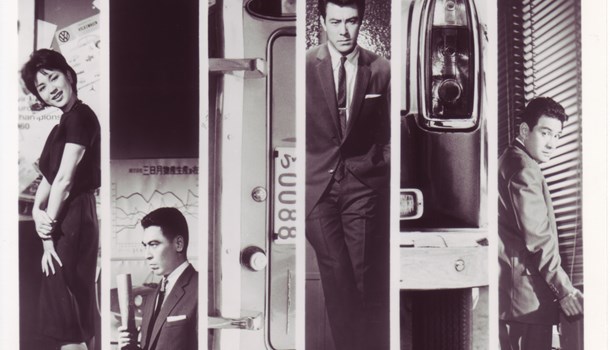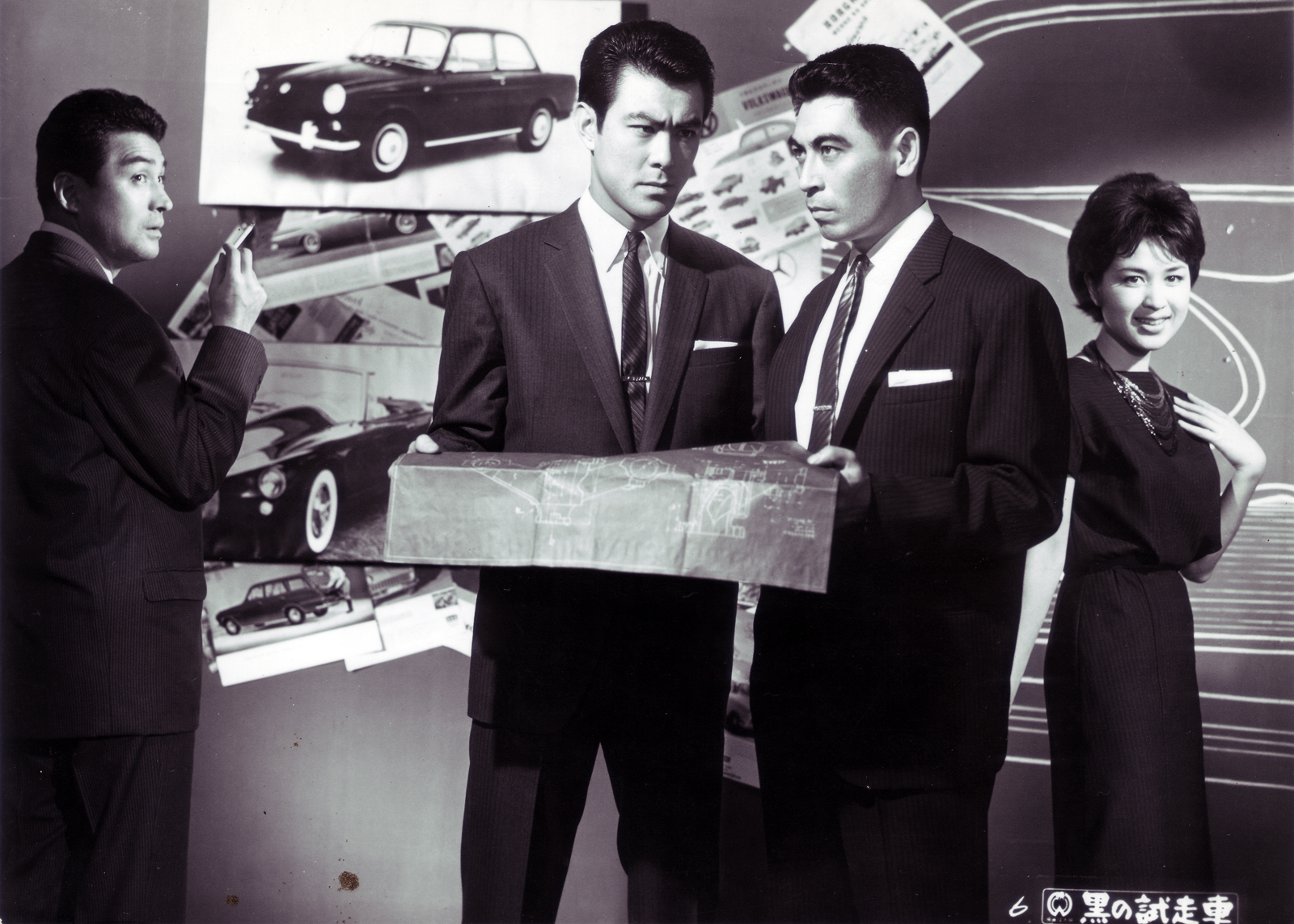
Written by Richard Durrance on 26 Feb 2022
Distributor Arrow Video • Certificate 15 • Price £13.99
A Yasuzo Masumura film I’ve not seen being released on blu-ray is always a reason for celebration, yet Black Test Car (1962) plus its sequel, The Black Report (1963), sat in my to-watch pile for months; one of my mental blocks on a film had hit, until for reasons I cannot understand or explain I was drawn inexplicably drawn into watching them.
Black Test Car: Car manufacturers, Tiger and Yamada, are both developing a new car and their respective espionage departments will use all means at their disposal for their car to come out on top.
It's not unfair to say the precis for Black Test Car is not one that makes you go: wow, what an exciting sounding film, but the 1960’s frequently saw Masumura at the height of his powers, able to put out disturbing, sometimes perverse dramas such as Manji, Red Angel and Irezumi with apparent ease. Black Test Car sits with these in being a real directorial tour de force because for all that the synopsis is bland the reality is a film that is painfully claustrophobic and feels as brutally vicious as any yakuza movie. Shot in stark monochrome, often in confined spaces full of conniving men, framed closely so that you can feel the desperation as the head of the Tiger espionage unit, Onoda, and his protégé, Asahina, desperately try to stop their plans falling into the hands of the Yamada company while plotting to bully, blackmail and threaten anyone they can into getting their hands on Yamada’s prototype car plans.
The film brutally satirises corporate politics to the point where morality is utterly blurred beyond distinction. There is almost no one who you can consider good or bad, right or wrong, almost every character, regardless of side, regardless if they are contractors to the companies, ultimately become embroiled in the dehumanising effect of corporate greed. Onoda's long-suffering wife clearly accepts her husband almost never coming home and then only to drink and scheme, while Asahina finds himself willing to prostitute out his bar-working girlfriend to get whatever information he can, even making it a pre-requisite for their getting married.
Considering early on its suggested there is a spy within the Tiger ranks, the eventual reveal is no particular surprise but the beauty of Black Test Car is that this doesn’t matter in the least, because it’s as much about the collateral damage as it is who are the more villainous villains or most blameless villains. Almost no-one is straightforward. In the world of the underdog car manufacture, Tiger, you trust almost no-one and nor should you. Masumura absolutely pours on the sweaty tension but importantly really gets under the skin of his characters, so that the film becomes more than just an adept thriller but a character piece, balancing both elements so that the audience is not only taken along for the thriller ride but have the additional emotional oomph of caring enough about the people on screen, even if many of those we meet are not particularly likable. Oddly they are not despicable either. Well, what they do may be, but you feel everyone is tarred with the same corrupt brush and it's almost impossible to claw off its sticky ooze. Some characters are able to eventually rise above the swampy marsh of the corporate feud, the film showing us that there can be ways out, though even these exits feel more like an act of emotional exhaustion, where a person can no longer take the guilt, and has collapsed under the weight of their sins.
If this feels grim, it’s not, because the core thriller elements always mean the film barrels along. It is also beautifully filmed, the widescreen black and white emphasising the sweaty reality of locked backrooms and shady locales but it’s also a film you cannot imagine being anywhere near as good in colour. The HD print is deliciously crackle free, so you suspect you have as best a print as you can get and the film deserves the treatment.
But what about its sequel, the first of many?
The Black Report: A businessman is murdered and prosecutor, Kido, finds it is harder to prosecute the apparently guilty party when his witnesses succumb to baser their instincts.
Though Masumura remains behind the reigns, The Black Report is not a sequel in the usual sense, no repeating characters, no remake of the same story instead it is thematically linked. Based on an Edogawa Rampo story (whose work is curiously difficult to get hold of in the UK and recently I tried, getting only a reader, and other available stories were apparently even by Rampo’s judgement minor works), The Black Report takes a different tack on the darkness that can become instilled in the human soul, similar to Black Test Car. Whereas in the first film espionage flays humanity, instead the death of a businessman and those in his sphere, including his son, (second) wife, secretary/mistress, brother and crooked defence lawyer, all mesh to tell a story that lays bare society's ills and prosecutor, Kido’s, illusions. It is also unusual in that much of the film is a courtroom drama, something, as I watched the film, I realised I had almost, if ever, seen. Though courtroom dramas are commonplace in western cinema I struggled to ever remember seeing lengthy courtroom scenes in a Japanese film. The story here with the shady defence lawyer is in many ways rote but again it is what Masumura does with the film that raises it above any mere genre film (and I say that knowing as I get older that I really am a genre geek), instead Masumura merges genre and angry social commentary into a surprisingly effective package. So that even if it may appear as if a packaged sequel of sorts it effectively stands alone.
If you want to criticise The Black Report then perhaps the pacing at times is a little off, it feels like a lot is packed into the first thirty minutes then it picks up again but it is also a film where it has some unusual details that unpack almost without you noticing it, such as how Kido as prosecutor feels almost like a policeman but actually the legwork is all done by an old-lag, whose hard work becomes more apparent in the latter stages of the film and how the old-lag connects with Kido’s more youthful righteousness is beautifully balanced.
Like Black Test Car, The Black Report has unusually intense performances. Both films really wring the most from their respective casts and there is a plethora of actors who you recognise from films of the period. The lead performances never fall into any of the more over the top performances of the period that some genre films require, nor would you say that anyone stands out but that is because the performances are universally convincing. You assume this is Masumura as a director and brings to mind Daria Nicolodi talking about working with the two great Gialli directors: Maria Bava and Dario Argento; watching Bava’s and Argento’s films you sense that Argento is the more visually exacting but reliant on an actor's skill, whereas Bava has similar visual nous but more skilled with his cast, as Nicolodi, years later confirmed. Masumura equally seems to be able to extract everything he possibly can from his cast. Sometimes this border on the edge, such as how Kido, as the frustrated prosecutor, could easily swing into excessively gung-ho self-righteousness but never quite does.
Ultimately, this Arrow release of Black Test Car and The Black Report make you hope that they continue to release more Masumura films. Of course, since this release – this is telling you my laziness – they have re-released Irezumi (sitting in the pile) and Red Angel (awaiting to buy blu-ray upgrade goodness) and Blind Beast (one I suspect I need to re-evaluate but shows Masumura’s brilliance but also a lack of subtlety). You think they are doing a Seijun Suzuki and putting out more of his back catalogue and that for me is a reason to be cheerful, regardless of whatever goes on in the world.


Long-time anime dilettante and general lover of cinema. Obsessive re-watcher of 'stuff'. Has issues with dubs. Will go off on tangents about other things that no one else cares about but is sadly passionate about. (Also, parentheses come as standard.) Looks curiously like Jo Shishido, hamster cheeks and all.
posted by Richard Durrance on 12 Feb 2026
posted by Richard Durrance on 10 Feb 2026
posted by Richard Durrance on 07 Feb 2026
posted by Richard Durrance on 03 Feb 2026
posted by Richard Durrance on 27 Jan 2026
posted by Richard Durrance on 19 Jan 2026
posted by Richard Durrance on 08 Jan 2026
posted by Richard Durrance on 17 Dec 2025